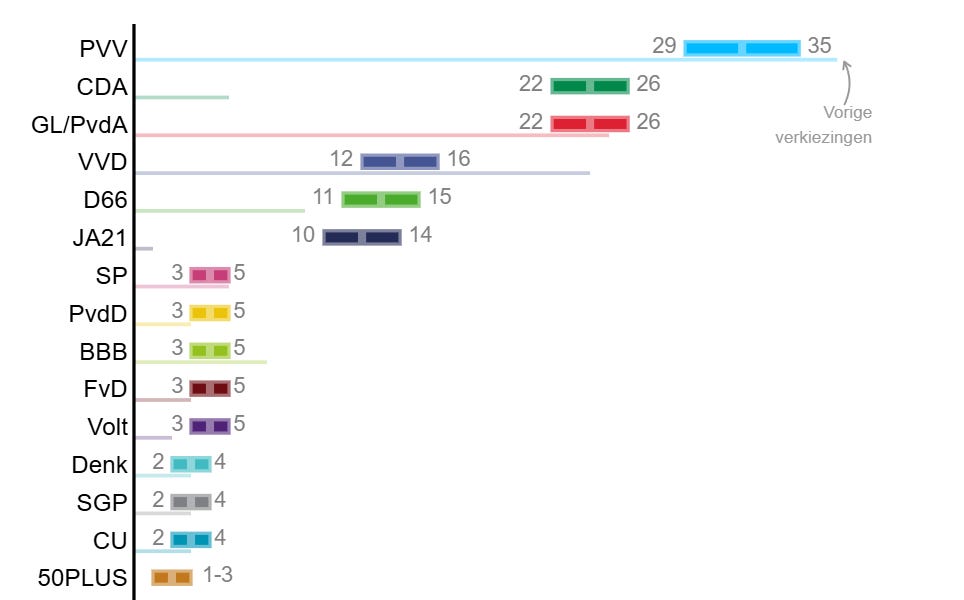The Dutch political system is based around coalitions.
After an election, all parties get together until a constellation with a parliamentary majority can gather around a shared policy platform, a coalition agreement (regeerakkoord/hoofdlijnenakkoord, etc.).
After the coalition is agreed, a government is formed.
This question resolves to YES for all parties which are part of the next governing coalition after the upcoming election (probably 29 october), and to NO for all others.
I'm defining 'part of the coalition' for this question as parties which take part in the final negotiations for a coalition agreement, and whose leaders sign the agreement.
For the resolution, it doesn't matter if the parties provide ministers for the cabinet, or if they only provide confidence and supply ('gedoogsteun').
So long as the party agrees to the final negotiated coalition agreement, it resolves to YES.
The cabinet Rutte 1 I count in this question as a coalition between VVD, CDA and PVV.
This question resolves when the coalition agreement is reached and announced.
If other parties which are not part of the coalition negotiations express support for the agenda of the coalition or the government, but they aren't party to the negotiations and haven't made a firm commitment, they will resolve as NO.
For example, the most recent coalition consisted of the parties PVV, VVD, NSC and BBB for the purposes of this question, even though a number of other smaller parties expressed that they were happy with this government and generally voted with the coalition.
If the coalition negotiations get really chaotic, it might become unclear which parties are part of the coalition agreement.
If parties are cagey when a coalition agreement is signed, I might have to make a judgment call, based on for example what the media says about which parties are in the coalition.
But that is an unprecedented situation, in modern dutch parliamentary history it's never been unclear which parties are part of the governing coalition when the cabinet starts.
In case a minority cabinet is formed without a majority in the dutch lower house of parliament (tweede kamer) and without a confidence and supply agreement, there might be several possible parties which can vote with the government to reach a majority on issues which are important to them.
In this case, only the parties which are part of the minority cabinet resolve to YES, not any temporary partners.
This also applies if the coalition has a majority in the lower house of parliament, but not in the upper house (eerste kamer).
If the coalition doesn't have a majority in the upper house, but there are several parties which might help them get a majority, these other parties still resolve to NO.
In case no formal coalition agreement is reached but a new cabinet is installed anyway ('zakenkabinet'), this question resolves to the party affiliations of any cabinet ministers at time of their swearing in.
UPDATE: Extra clarification in case a new cabinet is installed without a formal coalition agreement.
In case a new cabinet is installed without a formal coalition agreement, the question resolves to the party affiliation of any cabinet ministers, but not undersecretaries ('Staatssecretaris').
Party affiliation in this case does not mean simply party membership, but the person should actually be a party politician.
So it only counts for (former) members of parliament, (former) cabinet ministers, provincial councilors or provincial executives, municipal councilors or executives, who were party members prior to becoming cabinet minister.
For example, Dick Schoof had been a PvdA party member before becoming prime minister, but he had ended his party membership years prior.
But even if he still had been a PvdA party member when he assumed office, it still wouldn't resolve to PvdA, because he wasn't a prominent politician.
It would resolve to nothing.
If no cabinet is formed and new elections are called, that is irrelevant for this question.
This question resolves when a coalition agreement is reached or a cabinet is sworn in, regardless of how many elections take place in between.
The stated resolution date is arbitrary and can be extended if necessary.
🏅 Top traders
| # | Trader | Total profit |
|---|---|---|
| 1 | Ṁ466 | |
| 2 | Ṁ262 | |
| 3 | Ṁ176 | |
| 4 | Ṁ109 | |
| 5 | Ṁ92 |
My reasoning https://jitsegoutbeek.substack.com/p/dutch-coalition-forecasting, please tell me where I am completely off
@WieDan Hmm, to me these differences make sense. You might think that parties want to form coalitions with other parties that are ideologically close to them. But if we look at it historically, after an election usually the biggest parties form a coalition together, with perhaps one other small party. that roughly means that big parties have a high chance of being part of a coalition and small parties a low chance.
But it could be different this time, perhaps we'll break the trend. Lord knows that Dutch politics has been crazy these past few years.
I added some extra clarification for the rules in case a new cabinet is installed without a formal coalition agreement ('zakenkabinet').
I'm worried that this might happen if the rules were unclear.
This change prevents unpredictable resolutions in case the question would randomly resolve yes for the pirate party in case an unknown minister happened to be a member of that party.
It's only an exceptional case, probably we'll just get a coalition agreement and it won't matter.
But you never know.
